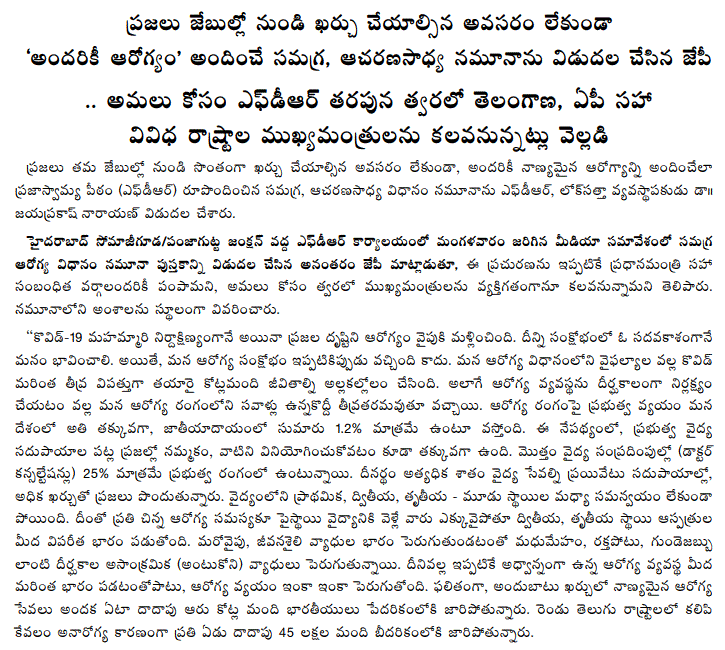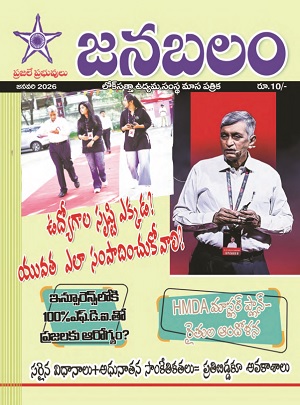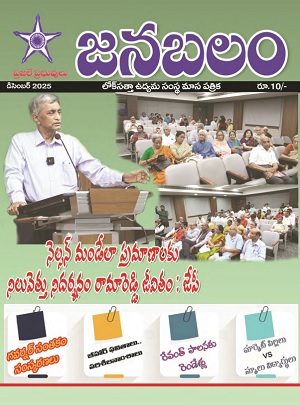Politicians, irrespective of their ideologies, per se are very shrewd and they know which side their bread is buttered on. See, how they set agenda for people and drive public discourse for their advantage. A topic of politicians' choice would come to the fore putting any issue of public interest- its importance and relevance notwithstanding-on the backburner.
The political class is blessed with the art of playing upon public sentiments while diverting people's attention from key issues in a jiffy. It thrives on the general public's short memory and the news media's burning desire to run after the latest information. I can cite two latest instances to drive this point home.
Telangana, akin to other States and countries, was on the boil in April and May, 2021 when the second wave of Covid-19 spelled the death knell. The global health crisis brought back the horrific weeks and dreadful days of 1979 when Skylab was about to crash at any moment. As the largest spacecraft ever was bound to hit the earth but no one knew exactly when and where, the smallest virus botched many lungs but no one knew exactly how and when.
As the politicians of those days sneaked into bunkers to withstand the impact of the Skylab metal ball, their ilk of the day quickly moved to their farmhouses or sprawling green campuses to be away from the virus. Those who came in contact with the dreaded virus, despite their best efforts to avoid human interactions, took shelter in highly sophisticated corporate hospitals even as general public was running from pillar to post in search of oxygen cylinders, intensive care unit beds and reliable medicines. Lakhs of people breathed their last in helpless conditions and the deceased were denied proper cremation due to the fear caused by the virus.
People were forced to spend their savings and sold off their gold ornaments, plots and lands to meet the medical needs of their family members. The tiniest virus thoroughly exposed the chinks in the medicare system prompting people to curse the government for its utter failure in dealing with the humanitarian crisis. The government was accused of playing down the number of casualties.
Exactly at this precarious point of time, the Telangana Chief Minister K Chandrasekhar Rao expelled the Health Minister Eatala Rajender from his cabinet following certain allegations of land grabbing. The government's political decision, wittingly unwittingly, eclipsed the public outrage. From May to till date, Eatala hogged the limelight as much as the Covid-19 did.
Then came Huzurabad by-election. The TRS government fought it tooth and nail by using money and muscle power to politically annihilate the six-time MLA Eatala, the BJP candidate, but to no avail. As soon as the results are out on November 2, a new subject was pushed on to the centre stage. Some non-issues during the electioneering, such as purchase of paddy, turned out to be the hottest topic in Telangana.
The high decibel war of words between the BJP and TRS and the latter's decision to stage dharnas across the State triggered a heated debate. No political leader talks about mishandling of the pandemic or by-election time treacherous tricks. Now the focus will be shifted to MLC elections and the government's decision to send Venkatrama Reddy, a district Collector till November 15, to the Legislative Council in the last minute. I don't know whether it is a deliberate joint attempt but very important issues of public importance were swept away by the new issues racked up by the politicians. Don't we learn lessons from our experiences? Is this the time to play political games instead of gearing up to handle the next wave of Covid-19 that is already taking away the lives of people in the other parts of the world?
A sincere attempt, in the form of a comprehensive report, titled, "Towards Viable Universal Healthcare," prepared by the Foundation for Democratic Reforms (FDR), spearheaded by the Loksatta founder Dr Jayaprakash Narayan, went unnoticed in the political cacophony filled with allegations and accusations.
Since India's wish to achieve Universal health Care (UHC) by 2022 came a cropper, in the absence of sustained financial flow, strong political will, committed leadership, sincere involvement of all stakeholders and community participation, the report comes as a guide to ensure a viable universal healthcare with a minimum cost and maximum benefit.
The report highlighted the fact that nearly six crore Indians are becoming impoverished due to lack of access to affordable health care and as many as 50 lakh people are slipping into the depths of poverty due to the out-of-pocket expenditure on health every year. The elected representatives should hang their head in shame to know that a vast majority (74.6 per cent) is depending on private sector to cure their diseases even though the cost involved in it is on a higher side.
People's financial condition is seriously impacted due to the low public expenditure (1.2 per cent of the GDP) on health. According to an estimate, in Hyderabad, every 22,323 persons have a liquor shop while there is only one police station for 77,792 residents. The State capital has one hospital dedicated for Covid-19 treatment for every 34,691 residents. You can imagine the situation in rural areas, where belt shops are more and medical facilities are less.
One of the key recommendations of FDR report is, establishment of public-funded primary care system, with a choice of selecting a family physician from a pool of ten available doctors, integrated with the existing primary healthcare centres; free diagnostic services in the locality; and a centralised drug procurement mechanism. It sounds like a traditional family doctor, a true well-wisher and not-for-profit service provider, taking care of our health. This model can bring back the lost human touch and missed trust between patients and doctors.
The report suggests to limit secondary and tertiary services to inpatient care upon referral and to make district and public teaching hospitals the mainstay for quality, cost-effective tertiary care. It also proposes public-private partnerships and innovative modes of financing without burning the pockets of people. If implemented, it my cost Rs.1,900 crore (0.8 percent of the budget) for Telangana and Rs.2,600 crore (1.13 percent) for Andhra Pradesh per annum.
Rank for hospitals and docs
No doubt, people are betrayed by the successive governments when it comes to healthcare. Despite having a plethora of schemes, people are vexed with the present healthcare system and Covid-19 has further disillusioned them. With abysmal infrastructure and unclean environs, most of the government hospitals failed to win the confidence of patients and their family members. Scared by the skyrocketing costs- doctor consultation fee, bills of diagnostic tests and price of medicines- lesser mortals prefer to try the other cheap medicinal methods at the cost of their health. I strongly feel that there should be a mechanism to collect patients' perceptions on the care they received, especially in the hospital setting.
There is a need to take up the feedback of patients on the lines of the USA's Hospital Consumer Assessment of Healthcare Providers and Systems (HCAHPS) survey to find out the issues at hand. "During the hospital stay, how often did nurses treat you with courtesy and respect?" is the first out of 27 basic questions in the survey. Hospitals and doctors should be ranked based on the survey inputs to bring in more accountability into the healthcare sector.
It is heartening to see the Telangana Chief Minister has realised the need of appointing a Health Minister, at last. The Finance Minister T Harish Rao, who was badly bruised in the fight against his former Health Minister Eatala at the hustings, has been given the portfolio. Instead, KTR should have been assigned this task given the fact that this ministry at this juncture can get more publicity followed by more popularity.
Anyway, people turn to KTR's twitter handle for medical help and the dynamic young leader is also enthusiastically extending his helping hand to the people in need. All said and done, a full-time minister for health can deliver the goods than a minister with additional responsibility.
There is no harm in making use of the vast experience of Dr JP and his team to ensure a robust medical system. What about appointing the Loksatta founder as a medical advisor with a two-year term? A magnanimous decision in this regard will usher in a new type of political culture in the country.
There is no doubt that Dr JP is a highly educated-dedicated professional with a medical background as well as a no-nonsense politician with impeccable character. Dr JP rightly pointed out in the afterward that true politics is about promotion of human happiness and health is a key ingredient in achieving happiness.
Before considering this piece of advice, the trio-KCR, KTR and Harish- should have a brainstorming session on the report made by Dr JP's team for the sake of general public. As Dr JP rightly pointed out, sirs, any positive step that can improvise the health sector can generate votes too.
By Dr Ramu Suravajjulla
Courtesy: The Hans India










